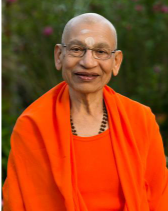
Spirituality: Anger arises from Desire

By Swami Viditātmānand Saraswati*
Behind each of the impulses of anger, there is some or the other desire or demand. Krodha (Anger) arises from kāma (Desire). We are very demanding people. We have strict demands about what other people should do, should not do, how they should behave, etc. We have several demands for ourselves also. If they are helpful to us, there is no objection to them; however, demand for others is indeed a cause for conflicts, because just like myself, others are independent individuals and they are not bound to respect my demands. If it is convenient to them, they will fulfil my demand otherwise they won’t. If they do not fulfil my demand, anger arises in me towards them. Thus, demand for others is a seed for anger and to be free from anger, demand should be dropped as much as possible.
Earlier in reference to karmayoga, prasādabuddhi was mentioned. Īśvara is the creator and controller of this universe and he is indeed the giver of the results. Therefore, whatever is around us – whether it is convenient to us or not – is created by Īśvara. There must be a reason for Him to create it like that. Even if I do not understand that reason, I can give Īśvara the benefit of doubt because he is sarvajña (omniscient, all–knowing). Therefore, I accept this creation of Īśvara, I accept it cheerfully and do not insist on it being different than what it is. Thus, if I am ready to accept the people, things around me and the situations as the prasāda of Īśvara, there will not be a place for demand and in that manner, the events of disappointment and of being angry due to disappointment will not arise.
Sometimes, our duty is such that whatever is surrounding us needs to be modified. If we have such responsibility or if it is our duty to control others, to keep them in order, to guide them in the right direction, we must do so as part of our duty. However, there is a place for prasādabuddhi in that also. First, I accept the people around me the way they are – they are helpless to be the way they are, it is their nature. With this understanding, empathy will be born in me for them, not anger. Then I do whatever is necessary with empathy. If there is a need to punish someone, I do that with empathy, not anger. By doing transactions in this manner, we can bring control over the anger and we can diminish its power slowly and the transactions become pleasant.
Conduct of svadharma (Dharma of self)
Moreover, as mentioned earlier, kāma -krodha (or rāga-dveṣa) cover up the power of discrimination and one gets deluded and therefore, gets motivated to follow the path of enjoyer ship rather than yoga. It was also described how kāma -krodha are the cause of all sins. Bhagavān says: tayorna vaśamāgacchet– do not be controlled by those two – rāga-dveṣa. They will generate motivation of enjoyership in you, they will deviate you from dharma, and they will motivate you to follow adharma.
Also read: Spiritual Discourses: Delusion and indiscretion are born due to anger and greed
You side with dharma. The discussion of the attitude of yajña, selflessness and self-surrender done earlier in this chapter is indeed the dharma for a human in the real sense, it is indeed the svadharma (dharma of self). It is difficult to practise because to put the attitude of surrender in practice, one has to drop selfishness, narrow-mindedness etc. These selfishness etc. are generated from the sense of insecurity and as long as there is a sense of insecurity, selfishness will emphasize itself. But, you do not submit to it. If you do not succeed in doing that easily, do not despair. Do not get deceived when it seems that others benefit by depending on adharma. Be assured that one can never succeed by practising adharma and where there is dharma, there is Īśvara, because dharma, values, the attitude of surrender etc. correspond to the nature of Īśvara, destiny, and therefore, be assured that by practising them you will gain the grace of Īśvara. Do not be fearful and in case it seems that you will have to die in practising svadharma, know that death is much better than practising adharma. In this manner, Bhagavān teaches to control the impulses of rāga-dveṣa originated from ignorance, insecurity etc. by practising svadharma. Svadharma means conduct in accordance with the nature of sva – self, ātmā. Earlier it was explained that the attitude of yajña is in accordance with the nature of yajña. Therefore, the attitude of yajña, philanthropy, selflessness, service etc. is svadharma. We will not call some special karma svadharma. We have to play different roles depending on the situation: father, son, mother, daughter, husband, wife etc.. There is something expected from each of these roles and that is decided based on the place, time and situation. One has to decide on his own what reaction is called svadharma in a given situation. There can be an error in that decision but if the spirit is pure, that error can be corrected.
When some values are sacrificed by subduing to some temptation, then it is called paradharma. That is adharma also. Therefore, not to subdue to rāga-dveṣa, means not to subdue to the temptation of sacrificing dharma. This is difficult, because
in doing so, we may need to sacrifice the material prosperity or achievements that the world, as well as ourselves, think of as valuable. Internal impulses will pressure us; however, Bhagavān clearly says not to subdue to such pressures. Bhagavān does not ask us to control such impulses thoughtlessly; however, He asks us to control them with understanding and perseverance/tenacity.
*Swami Viditatmananda Saraswati has been teaching Vedānta Prasthānatrayī and Prakaraṇagranthas for the last 40 years in Ahmedabad, Gujarat. Throughout the year, he conducts daily Vedānta discourses, accompanied by retreats, and Jñāna Yajñas on Vedānta in different cities in India and in foreign countries.






Great post! We will be linkihg to this great artice on our website.
Keeep up the great writing.